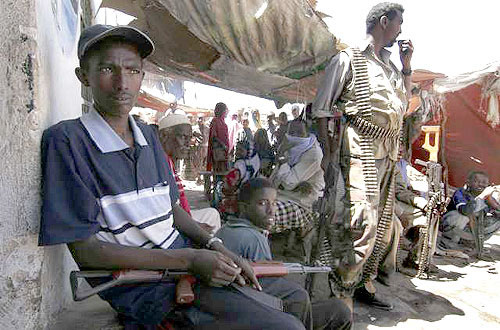 |
FEW PROSPECTS: Aden Osman, left, sits in the crowded marketplace in Baidoa, Somalia. With no education, Aden, 19, reluctantly works as a gunman to support his parents and three sisters.
(Evelyn Hockstein / LAT) |
Aden Osman belongs to a generation of Somalian youth that has known nothing but war and lacks the skills to rebuild a ruined nation.
By Edmund Sanders
Times Staff Writer (LA Times)
April 17, 2006
BAIDOA, Somalia — The young man is nostalgic for a time he can't even remember.
Aden Osman was 4 when the Somalian government collapsed in 1991. When he was 6, the bodies of American servicemen were dragged through the streets of Mogadishu and most of the world turned its back on his country.
That's when his childhood memories begin to grow clearer.
There was the day when he was 9 and his uncles were shot while fetching water. He had to bury them. Another time, a rival clan slaughtered the family's livestock and poisoned their well. And in a battle between warlords, he was separated from his family for five days without food.
Most of all, he remembers the running, the constant fleeing through the bush as his family sought refuge from the clan warfare that seized the country 15 years ago after the fall of strongman Mohamed Siad Barre. They prayed for enough time in one place just to grow some food.
But Aden's parents have told him about better times, before the warlords, when the country was run by something called a government. Back then, they had cattle and crops to eat. People walked the streets at night without fear, his parents said. Children went to school and there was a hospital for the sick.
These are the times Aden dreams of.
"My parents say there were no checkpoints back then," he said. "There was no random killing without reason. And if you killed someone or robbed someone, you were punished. I wish I lived then. I guess I was born in an unlucky time."
Aden is one of millions of teens coming of age with little memory of Somalia's past and few skills to build its future.
The country is in ruins. A transitional government is meeting here in Baidoa, making the latest effort to put the nation back together. But even if the lawmakers succeed, Somalia desperately needs architects, teachers and doctors. Most government buildings were reduced to rubble in the civil war. Roads are broken and airports are little more than dirt strips.
Somalis grow what food they can and import the rest from Yemen and other countries. Wells and rivers are drying up. Water, when it can be found, is often unfit to drink.
After 15 years of anarchy, fewer than one in five Somalian children has ever stepped into a classroom, and even those received only the most basic skills.
"We have lost an entire generation," said Somalian Foreign Minister Abdullahi Sheik Ismail, part of the transitional government attempting to wrest control of the country from warlords.
Humanitarian experts predict Somalia will need to scramble in coming years to educate and train these young people through adult vocational schools. But many predict a lack of skills will hinder its prospects of recovery for at least a decade.
Now 19, Aden has never attended school. He can't read or write. With all the moving, he even lacks the farming skills that might have been passed down by his father. He's watched television once and never used a computer. Offered a soda to drink, he can't figure out how to use a bottle opener.
Most days, he said, he sits at home until the afternoon, and then goes looking for work. More often than not, he ends up hanging out with friends, chewing on stems of khat, a plant that provides a mild, amphetamine-like euphoria.
"I don't know what to do with my life," Aden said. "Some days I just chew. There are no jobs. I don't have any direction."
More than half of Somalian teens report using guns, and one in four boys under age 18 has fought with a militia, according to a 2003 UNICEF study. Child malnutrition and malaria rates are among the highest in the world. And although the psychological impact has yet to be accurately measured, many children suffer from nightmares, difficulty concentrating and aggressive behavior, according to the U.N. child-welfare agency.
"Ever since these kids opened their eyes, there has been nothing but fighting," said Mohammed Abdi Ali, headmaster at the only secondary school still open in Baidoa, a war-torn southern Somalian town. "It's all they know. This generation has lost all their aspirations."
His tidy school serves as an unexpected refuge from the rest of Baidoa's decay. There is new paint, rows of desks and algebra equations on the wall. It's easy to imagine Aden among the handful of fresh-faced uniformed students in the senior class.
Continue.... Page 1 | 2 | Next
Source: LA Times April 17, 2006